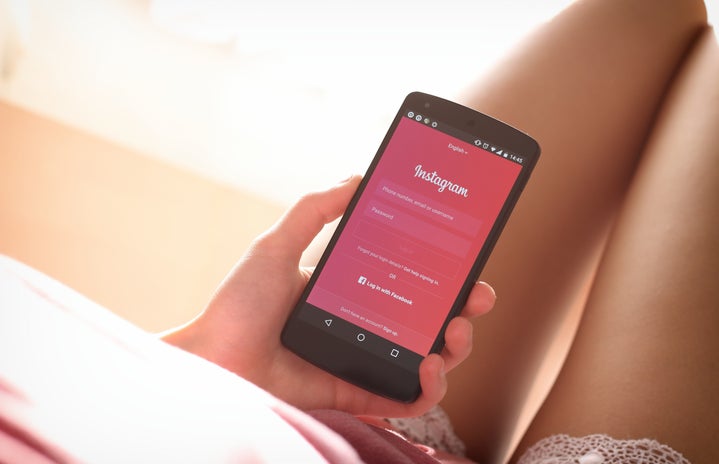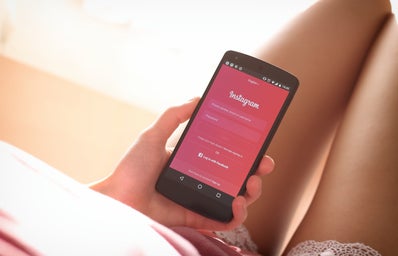I like to think we’ve all been there: sat at home immersed in our screens, a hollow black gulf opening up inside our chests as we stare at everyone’s colourful, seemingly ‘perfect’ lives and start to see our own in black and white.
I like to think we’ve all been there: catching sight of ourselves in the mirror after a long day of seeing slim, airbrushed models and celebrities and wondering why we don’t look the same.
I like to think we’ve all been there, because at least then I’m not alone. I know I’m not alone. Almost everyone I’ve spoken to about social media has expressed some sort of negative impact it’s had on their lives, whether that be their mental health, attitudes towards their body, their relationships or even in some cases their eating habits.
It’s hard not to begin to judge ourselves and our lives against the world of perfectionism surrounding us. It’s no surprise that eating disorders are on the rise all around the world, more so in more technically advanced countries, and there’s a clear reason for this: social media.
True, there’s always been a standard of beauty in society for people (particularly women) to aspire to – think Audrey Hepburn in the 50’s, Brooke Shields in the 80’s or Kate Moss in the 90’s. The difference in our world today, however, is that images of flawless, photoshopped models and celebrities are everywhere, right under our noses all the time when we so much as pick up our phone – and there are more and more of them.
With advancements in plastic surgery and photoshop (the Kardashians deserve a shoutout here) it is becoming more and more achievable to transform into what pop culture demands you be nowadays: a petite, tiny-waisted, curvy, clear-skinned, tanned (but white or at least light skinned) goddess – that is if you have the money which sadly, not many of us do.
So with more and more women moulding themselves into these beauty ideals, social media has become crowded with their perfectly photoshopped, professionally lit images; photos which seem candid and casual, shot by a friend even, have been retouched and edited till no imperfection remains before being posted to millions of trusting followers. Some might argue there’s nothing wrong with this – after all, who doesn’t want to look their best, especially in the public eye?
But when it misleads young girls, it’s wrong. When it promotes an unrealistic, potentially health-threatening image to millions of people, it’s wrong. Denying photoshop and plastic surgery to instead credit a new brand of Instagram ‘detox tea’ for this amazing new figure to gain profit is wrong.
With more and more celebrities and influencers using social media to speak out about their struggles with body image (Lady Gaga defending her belly fat, Chrissy Tiegan fighting back at trolls making fun of her figure, or Tess Holliday) social media is becoming a more bearable, acceptable climate but there is still a huge, toxic ‘perfection’ culture putting unattainable body types on pedestals and selling us placebos that promise to make our shapes ‘just like theirs’ instead of teaching us to love the skin we were born in. This not only distorts how we view our own bodies but also those of others, we’re more likely to judge others for how they look when we are exposed to this niche beauty standard 24/7.
Adding to this, seeing tabloids and troll accounts make fun of celebrities for gaining weight or somehow not fitting this standard (comments were hounded at Kim Kardashian whilst she was pregnant) without repercussion makes us more likely to troll others and ourselves in our heads. The damage this does over time is terrible; undermining ourselves at every opportunity whether it be laid in bed wondering why our life is so dull compared to celebrities or putting ourselves down when seeing our reflection makes us feel defective. We begin to believe we’re ‘not right’ in some way, maybe because we haven’t got itty-bitty waists or round hips, or the type of nose and cheekbones that could only be obtained under the knife.
This is the weight of social media; it slowly drags us down and the more it’s consumed, the lower we sink. In no way am I saying the whole of social media is evil, and I’d never go as far as to say everyone should give it up completely – but learning to consume it in healthy doses for short amounts of time is a necessary skill we need to teach ourselves and younger generations who will grow up viewing these images.
I know so many people who feel, or have felt depressed, anxious, insecure or lacking in confidence and I’m certain so many of these issues could be helped by stepping back from socials such as Instagram and Facebook. Admittedly I’ve been in this position, and found limiting my social media activity to a max of an hour a day gave my mental health the break it needed. Upon looking at my screen time I found I was spending around 24 hours a week on social media; doing the maths, I realised if I carried on in this way until I was 90 I would have spent at least 10 years of my life pouring over how perfect everybody else’s lives were instead of living mine to the full.
It’s true that not all of the social media world is evil, but it’s indisputable that a lot of the content we see on there can make us feel ‘less than’ and even defective in some cases – not curvy enough, slim enough, successful enough, exciting enough. The point of this piece is not to condemn social media entirely but to reason why – like sugar, alcohol and other addictive things in life – it should be consumed healthily and sensibly for the sake of our mental health, body confidence and that of others.
Words By: Pearl Brewster
Edited By: Laura Murphy


